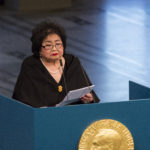 “I was just 13 years old when the United States dropped the first atomic bomb, on my city Hiroshima. I still vividly remember that morning. At 8:15, I saw a blinding bluish-white flash from the window. I remember having the sensation of floating in the air. As I regained consciousness in the silence and darkness, I found myself pinned by the collapsed building. I began to hear my classmates’ faint cries: “Mother, help me. God, help me.” Then, suddenly, I felt hands touching my left shoulder, and heard a man saying: “Don’t give up! Keep pushing! I am trying to free you. See the light coming through that opening? Crawl towards it as quickly as you can.”
“I was just 13 years old when the United States dropped the first atomic bomb, on my city Hiroshima. I still vividly remember that morning. At 8:15, I saw a blinding bluish-white flash from the window. I remember having the sensation of floating in the air. As I regained consciousness in the silence and darkness, I found myself pinned by the collapsed building. I began to hear my classmates’ faint cries: “Mother, help me. God, help me.” Then, suddenly, I felt hands touching my left shoulder, and heard a man saying: “Don’t give up! Keep pushing! I am trying to free you. See the light coming through that opening? Crawl towards it as quickly as you can.”
– Setsuko Thurlow’s Nobel Lecture, after ICAN was awarded the Nobel Peace Prize in 2017.
Setsuko Thurlow was a 13-year-old schoolgirl on 6 August 1945 in Hiroshima. Most of its residents were civilians who were incinerated, vaporised, carbonised – among them, members of her own family and 351 of her schoolmates. Her story, and many other stories illustrate the horrible consequences of using nuclear weapons.
Nuclear weapons are indiscriminate by nature. There is no way to use them without causing catastrophic harm, without killing children, women, and men. The stories of those who survived the only use of nuclear weapons in war, 75 years ago, are slowly fading from our collective consciousness.
This year to mark the 75th anniversary of those tragic days, people around the world are speaking out and insisting that they will not play any role in the future use of nuclear weapons.
Those raising their voices include leaders in the financial sector. For example, Pat Miguel Tomaino from Zevin Asset Management writes:
“In our view, producing weapons and relying on warfare for profit is inherently risky. Nuclear weapons also increase the level of systemic risk at large. Weapons companies, which cultivate close relationships with militaries and often seek other ways to build the war machine, have also been implicated in questionable activity and human rights violations.”
Others are speaking out as a matter of faith. Like the Catholic connected bank in Germany, Bank Fur Kirche und Caritas eG, who want to motivate other investors to also join them with strong policies preventing any investment in nuclear weapon producers.
This anniversary is a moment, a snapshot, when anyone and everyone can and should raise their voice against nuclear weapons. But it is not the end of the story, and there is more that can be done to make sure we truly honour the survivors and never allow such a tragedy to take place again.
If you are an individual, there are ways you can make sure your own investments are not tied to nuclear weapon producers.
Institutional investors can set in place strong polices to prevent any links to the nuclear weapons industry.
To end nuclear weapons, no one will be able to do everything, but everyone is able to do something to keep pushing until we are all free from the devastating nuclear threat.
